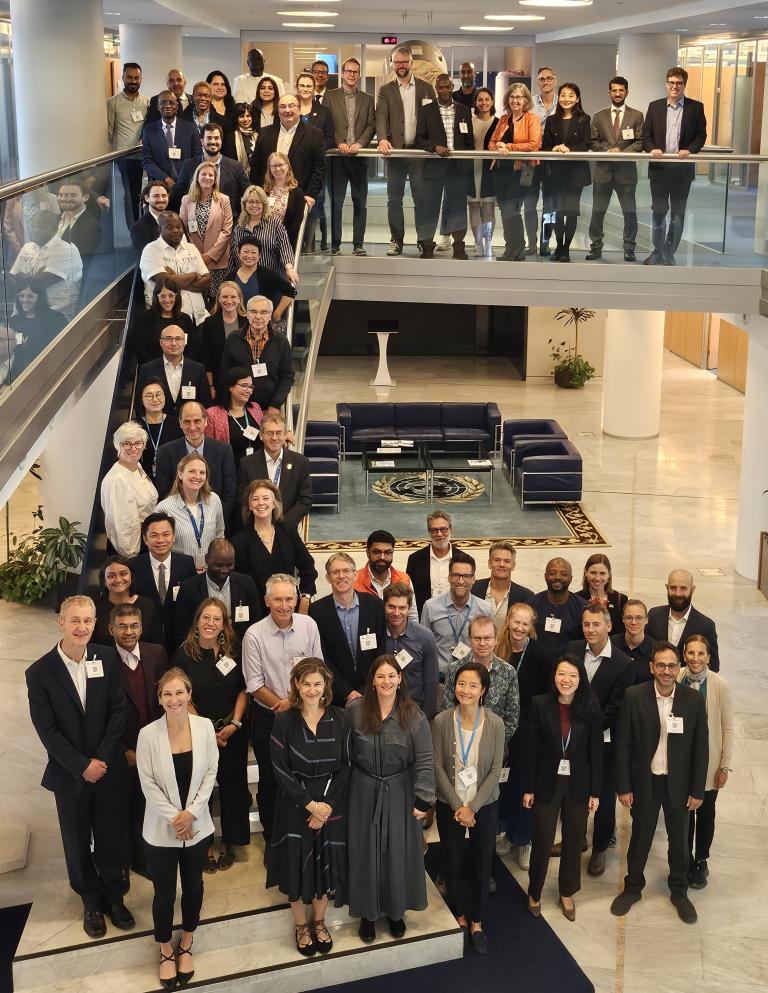Climate and health data must be integrated
Climate change is the most significant challenge to global health, and the integration of climate information into routine decision-making in the health sector is critical.

The World Health Organization (WHO), World Meteorological Organization (WMO), Wellcome and the Rockefeller Foundation therefore brought together over 75 technical partners to advance action towards the development of scalable, reliable, interoperable systems for integrated climate-informed health monitoring and support.
Held at the WMO headquarters in Geneva Switzerland from 10-11 September 2024, the meeting convened funders and leading experts in health information systems, digital health, climate data, and climate-health research and policy, as well as representatives from health ministries.
“We are at a unique moment where the convergence of climate science, technology, and public health provides us with unprecedented opportunities. By combining the expertise of the meteorological community with that of the health community, there is tremendous potential to support the most vulnerable," said Ko Barrett, WMO Deputy Secretary General.
This meeting advanced the technical and policy agenda for the use of weather and climate information for health decision making, as outlined in the WHO-WMO Implementation Plan for Climate, Environment, and Health, the WHO resolution on Climate Change and Health, and the COP28 Health Declaration.
It agreed a draft three-year action agenda for integrated climate and health data and surveillance systems, identification of prioritized gaps, and draft initial requirements for the integration of climate/weather information into health information systems.
“One of the critical reasons for this meeting is that we don't want excuses by anyone - the decision makers in the governments or in the private sector - to say that we're postponing action because we didn't have enough data. We don't want anyone to say "we didn't know". This is why this fantastic collaboration with the WMO over the years has been a great pleasure," said Maria Neira, Director of the Department of Environment, Climate Change and Health at WHO.
WMO and WHO have close, longstanding collaboration through the WMO-WHO Joint Office for Climate and Health, which provides interagency coordination for strategic and technical activities since 2014 and supported the development of an integrated ClimaHealth website. The Office promotes the coordinated development and use of climate, weather, and environmental services to improve public health. It increases awareness, builds capacity, and connects meteorological services and experts in the health sector as part of an active partnership for climate adaptation and environmental risk management.
“We can’t do climate & health without the climate. We need integrated surveillance & climate services for health and can no longer afford to be flying blind.” Madeleine Thomson, Climate Impacts at Wellcome

Key meeting themes and takeaways
- Urgency and Opportunity
There is “tsunami-scale demand” for high quality data and decision support about climate risks from local and national health policy makers and technical partners. Isolated projects have demonstrated success, especially over the last 10 years, for example leading to integrated data observatories in Brazil, heat early warning systems in Senegal and dengue surveillance in Vietnam. But the mainstream adoption of climate-informed health decision support systems remains limited. An action agenda to fill gaps and meet new requirements is urgently required to meet this demand. - Collaboration and investment across sectors for systems capacity development
Investments in both the health and meteorological sectors must be harmonized. The meeting proposed concrete steps for enhanced collaboration between national health and meteorological actors to create robust decision support tools. This includes improving data availability, accessibility, harmonizing data standards, and fostering partnerships that bridge the gaps between climate and health information systems. - Building on Existing Frameworks
The integration of climate and health information systems can build upon established platforms and initiatives - which require scoping but offer broad opportunities for scaling. The WHO-WMO Unified Data Policy, WMO Information System (WIS.20), the Health Data Collaborative, ATACH, and other international initiatives are paving the way for improved data collection, sharing, and accessibility. - From Projects to Systems
There is a clear need to transition from individual ad-hoc demonstration projects to sustainably funded, interoperable data systems that provide trusted information for decision-makers on a routine basis. This requires strategic investments, standardized protocols, and enhanced digital infrastructure, particularly in low-resource settings. - Innovative Tools and Future Directions
The rapid advancement of digital and AI technologies presents both opportunities and challenges for the climate-health nexus. Tools like cloud computing, advanced digital software for health information data collection and processing, and AI-driven climate-health models have the potential to address local health challenges when co-developed with country stakeholders. Participants noted new technologies need to be leveraged equitably and effectively, underscoring the need for user-centric, quality assured and accessible solutions. - Good practices and standards are key for trusted decision-support
Capacity is needed to ensure that decision-support systems operate with the best-available data, utilize good practices in co-producing integrated climate and health


